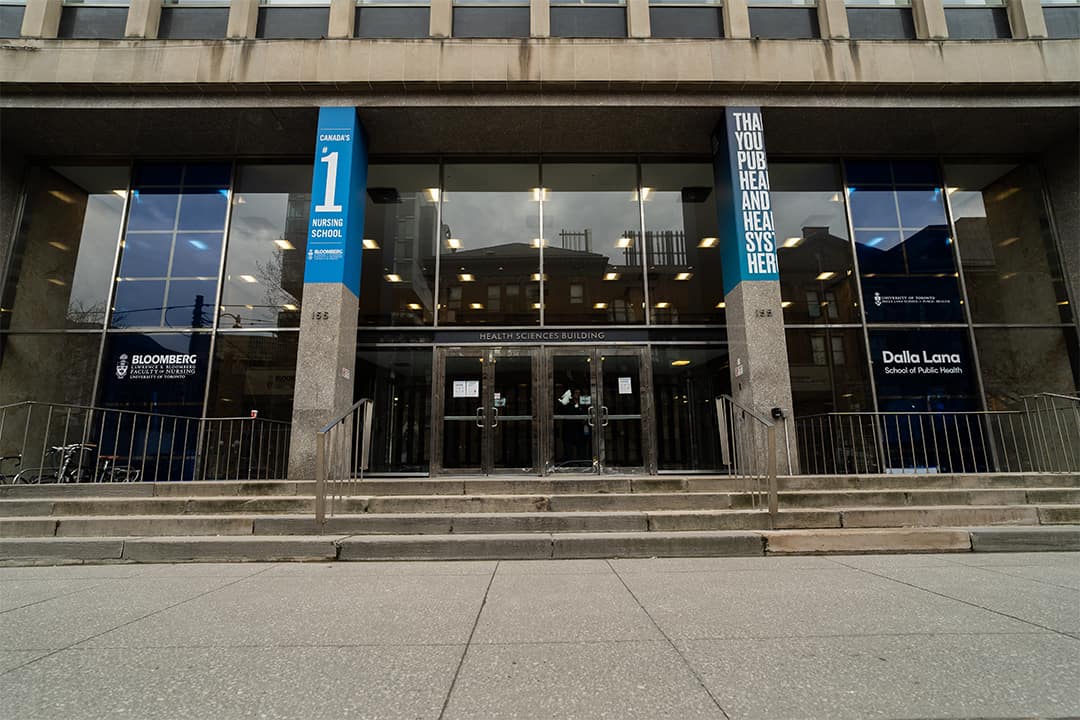In a move toward enhancing its commitment to addressing health disparities, the Dalla Lana School of Public Health (DLSPH) Waakebiness Institute offers an innovative master’s degree program that spotlights Indigenous health. U of T’s Master of Public Health in Indigenous Health (MPH-IH) is an initiative looking to empower students and healthcare professionals to understand the unique health challenges faced by Indigenous communities caused by colonialism as well as systematic and institutional racism.
The Waakebiness Institute has partnered with Indigenous organizations like the Kenora Chiefs Advisory and Chiefs of Ontario for wellness through research and education and to create a collaborative hub for the U of T community. The program was spearheaded by the first Indigenous health lead at the DLSPH, Assistant Professor Angela Mashford-Pringle, who is an Algonquin woman from Timiskaming First Nation. Mashford-Pringle serves as the program’s coordinator. In an interview with U of T News, she outlined that “the Indigenous definition of health is that you have balance in your physical, emotional, mental, and spiritual self in your family, community and nation.”
With a focus on evaluating interventions for disease prevention and enhancing health outcomes, this program will bridge the gap between Indigenous and non-Indigenous health outcomes.
Building a sense of community outside of lectures
In an interview with U of T News, Dr. Mashford-Pringle highlighted the program’s preservation of a sense of community through students’ direct engagement with Indigenous communities. The program goes beyond conventional lectures with land-based learning. Here, students spend time with Indigenous Elders and knowledge keepers on nature walks and fire ceremonies to learn about the significance of the land in Indigenous culture and how displacement affects Indigenous communities’ health outcomes.
In an email to The Varsity, Michelle Edgar, a current MPH-IH student and Two-Spirit Anishinaabeg woman from The Mississaugas of Scugog Island First Nation, highlighted the value of practical learning used in the program.
“Having access to elders, knowledge-keepers, and medicine people that would regularly have taken years of community engagement to develop relationships with is such a unique benefit to people that may not have otherwise ever had the opportunity to be exposed to those knowledges. Having it clearly communicated that the time it takes to develop and hone Indigenous knowledges to the point that you are recognized and respected in community is of equal or greater value than degrees handed out by Western institutions is something really important for people to hear,” she wrote.
Admissions to the program
This professional graduate program has no thesis requirement and prepares students for diverse career paths in community governance, policy development, research, industry, and academia. From research methods in Indigenous health to public health sciences, students have the freedom to choose elective courses tailored to their interests and aspirations.
At its core, the program prioritizes First Nations, Inuit, and Métis knowledge, pedagogies, theories, and frameworks for teaching, learning, and research in the field of public health. The features that set this program apart from other programs in Health Studies include immersive land-based activities and hands-on research projects, like studying Indigenous food systems, creating opportunities for students to learn beyond the walls of a classroom.
And here’s the beauty of it: this program is open to everyone.
“The overall culture and atmosphere of the MPH-IH program is complicated, but in a good way… Rather than a didactic approach where the knowledge inherent to my lived experience as an Anishinaabeg person on these lands is disregard[ed], it is seen as an asset,” wrote Edgar. “Community relations and connections are encouraged. Collaboration and peer knowledge sharing is encouraged. A more rounded and robust learning experience is available within the MPH-IH program than I have seen offered elsewhere.”
Admissions processes look beyond grades, valuing lived experiences, community engagement, and a deep understanding of the social determinants of health. Prospective applicants are encouraged to possess a background in social sciences and interdisciplinary studies, reflecting the interconnected nature of health disparities. The core skills embedded within the curriculum empower students to address the multifaceted challenges Indigenous communities face. These competencies include cultural safety and community needs assessment, program planning and implementation, and research evaluation.
For those curious about the MPH in Indigenous Health, the DLSPH’s Open House in October offers a glimpse into the program’s ethos and values. It’s an opportunity to connect with faculty, current students, and Indigenous leaders who are helping to shape the future of Indigenous health.



No comments to display.